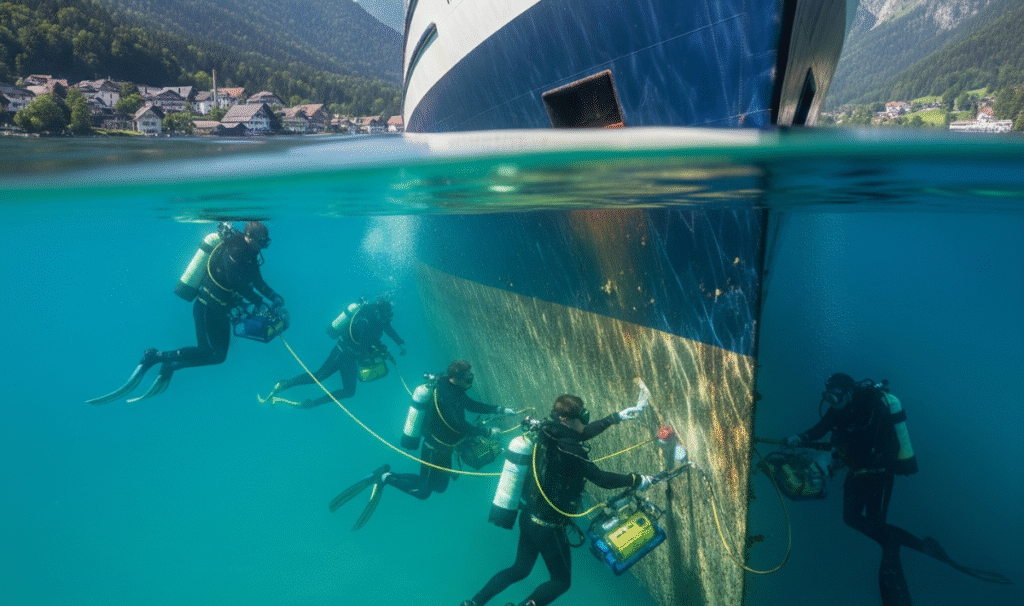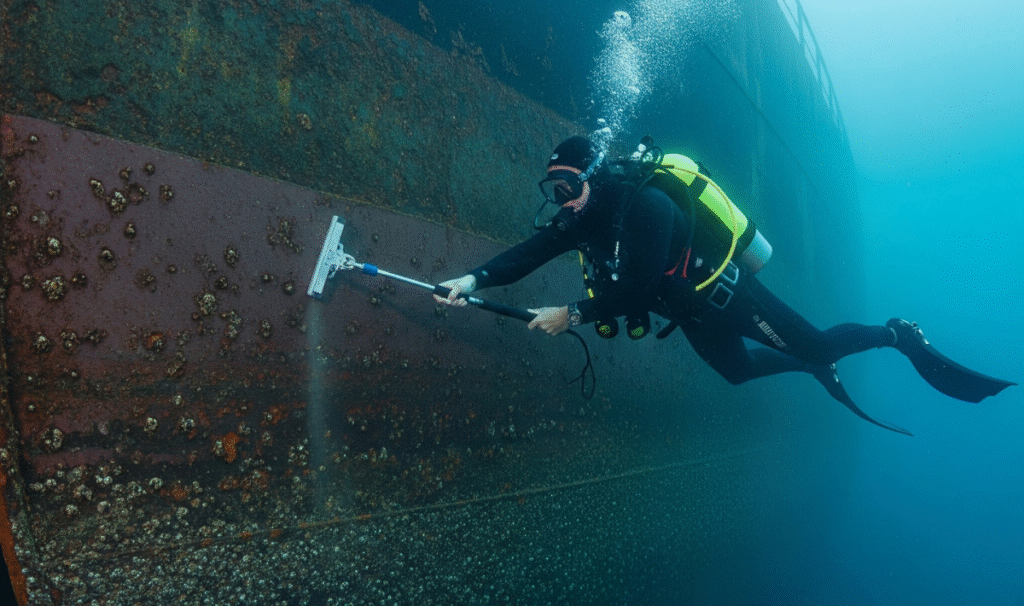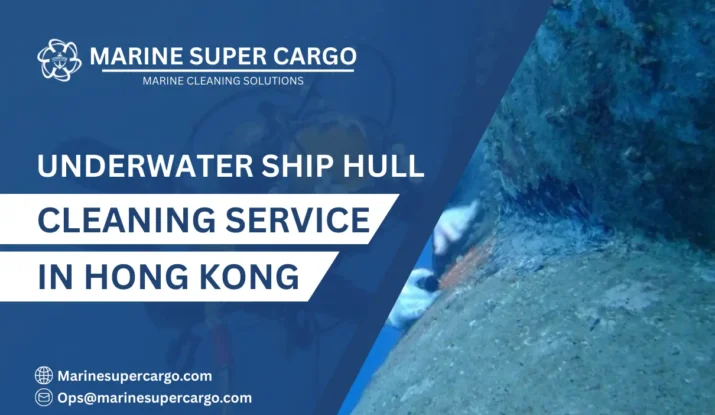When you look at a ship gliding across Victoria Harbour, its massive frame evokes strength and power. But under the waterline, things are not always as smooth as they appear. Barnacles, algae, and layers of stubborn growth attach themselves to hulls like uninvited guests, quietly sabotaging performance.
This is where underwater ship hull cleaning in Hong Kong steps in. With its bustling port, one of the busiest in the world, Hong Kong handles vessels of every size—tankers, cargo ships, passenger liners. Here, hull cleaning isn’t just an occasional task—it’s central to keeping ships efficient, compliant, and ready for the challenges of global trade.
Let’s dive into the three key benefits of underwater ship hull cleaning in Hong Kong and see why it’s more than just maintenance—it’s a competitive advantage.
Understanding Underwater Ship Hull Cleaning
What Happens During Hull Cleaning?
Hull cleaning involves specialized divers or remotely operated machines removing layers of biofouling—slime, barnacles, mussels, and algae—from a ship’s submerged surfaces. Think of it as peeling off invisible weights that hold a vessel back.
Once underwater ship hull cleaning in Hong Kong is performed, the ship feels like it has shed a hundred anchors. Speed increases, drag decreases, and the fuel savings start stacking up almost instantly.
Why Hong Kong is a Strategic Hub for Ship Maintenance
Hong Kong’s location on the South China Sea makes it one of the busiest shipping hubs globally. Its port sees constant traffic, from mammoth container vessels to coastal ships. This kind of activity requires vessels to be kept in peak condition. Thanks to its vibrant maritime service sector, underwater ship hull cleaning in Hong Kong has become a vital service offered to ships worldwide.

Fuel Efficiency and Improved Vessel Performance
How Biofouling Creates Drag
Barnacles, algae, and other marine organisms may look small, but collectively, they create resistance that slows ships dramatically. Research from imo.org highlights that even light slime buildup can increase fuel usage by up to 10%, while heavy fouling raises it as high as 40%.
The Immediate Gains After Cleaning
After underwater ship hull cleaning in Hong Kong, crews often report reduced vibration, smoother navigation, and measurable fuel savings. Imagine an athlete running without ankle weights—that’s the ship’s new freedom.
Environmental Protection and Regulatory Compliance
Preventing Invasive Species Transfer
Fouled hulls don’t just slow down vessels—they transport marine “stowaways” around the globe. By carrying invasive species into new ecosystems, ships risk ecological imbalance. Regular underwater ship hull cleaning in Hong Kong helps combat this, protecting biodiversity.
Meeting International Standards like MARPOL and IMO
The MARPOL Convention and organizations like iaphworldports.org emphasize clean hulls as part of global maritime sustainability. Non-compliance can result in penalties, denied port entry, or higher insurance costs. Choosing underwater ship hull cleaning in Hong Kong ensures ships remain in line with international laws, safeguarding both operations and reputation.
Long-Term Cost Savings and Hull Preservation
Protecting Against Corrosion
Biofouling traps moisture against the hull, accelerating corrosion and wearing down coatings. Left unchecked, this can lead to costly structural repairs. Regular underwater ship hull cleaning in Hong Kong helps protect steel surfaces and keeps anti-fouling paints effective for longer.
Reducing Expensive Maintenance Down the Line
Preventive cleaning saves ship owners thousands in emergency dry-docks and major hull restorations. Investing in predictable schedules of underwater ship hull cleaning in Hong Kong turns a big risk into manageable, routine upkeep—saving enormous costs long term.
The Bigger Picture: Why Hull Cleaning Matters Globally
Fuel Efficiency and Carbon Reduction Goals
Every extra gallon of fuel wasted by fouled hulls adds unnecessary CO₂ to the atmosphere. With shipping under pressure to decarbonize, cleaning is a powerful tool. Studies from cleanship.co show how consistent cleaning significantly cuts vessel emissions—one of the simplest sustainability wins in the industry.
Hong Kong’s Role in the Green Shipping Movement
Hong Kong is actively aligning with international decarbonization efforts. By promoting services like underwater ship hull cleaning in Hong Kong, it’s reinforcing its image as a modern, eco-smart shipping hub that balances trade efficiency with environmental responsibility.
Best Practices for Underwater Ship Hull Cleaning in Hong Kong
Certified Divers, Tools, and Eco-Friendly Processes
Hull cleaning requires precision. Certified divers following imca-int.com standards use advanced tools that effectively remove fouling without stripping protective paint or polluting the sea.
Pairing Hull Cleaning with Inspections
Many smart operators take advantage of cleaning sessions to also conduct inspections of propellers, rudders, and thrusters. Pairing inspection with underwater ship hull cleaning in Hong Kong maximizes efficiency and ensures early fault detection.

Challenges and Considerations in Hong Kong’s Waters
Seasonal Biofouling and Traffic Demands
Hong Kong’s subtropical waters encourage marine growth year-round, especially in summer. Combined with heavy maritime traffic, this makes underwater ship hull cleaning in Hong Kong essential for avoiding schedule delays and poor performance.
Balancing Efficiency with Eco-Protection
Aggressive cleaning can sometimes release harmful debris into the waters. That’s why eco-conscious practices are emphasized in Hong Kong, ensuring that underwater ship hull cleaning in Hong Kong is efficient yet environmentally safe.
Conclusion
The tiniest barnacle can derail a voyage by costing thousands in wasted fuel and damaging ship steel over time. The underwater ship hull cleaning in Hong Kong—optimized performance, environmental protection, and reduced long-term costs—makes it a smart, future-proof investment.
For Hong Kong’s dynamic port and shipping industry, underwater cleaning isn’t just about keeping a hull shiny. It’s about keeping ships faster, greener, and financially healthier for decades to come.
FAQ:
Q1. How often should underwater ship hull cleaning in Hong Kong be done?
Every 6–12 months, but tropical waters like Hong Kong can require more frequent cleaning to prevent rapid biofouling.
Q2. Is hull cleaning safe for marine ecosystems?
Yes—when performed with eco-conscious tools and in line with IMO guidelines, the process is designed to protect local ecosystems.
Q3. Can hull cleaning really save a lot on fuel?
Definitely. Clean hulls can lower fuel consumption by up to 40% in heavily fouled cases.
Q4. Does regular hull cleaning extend the ship’s lifespan?
Yes—it preserves coatings, prevents corrosion, and reduces the need for costly dry-docks.
Q5. Why is Hong Kong a key hub for hull cleaning?
Because of its immense shipping volume, subtropical waters that encourage fouling, and a strong commitment to green shipping initiatives.


